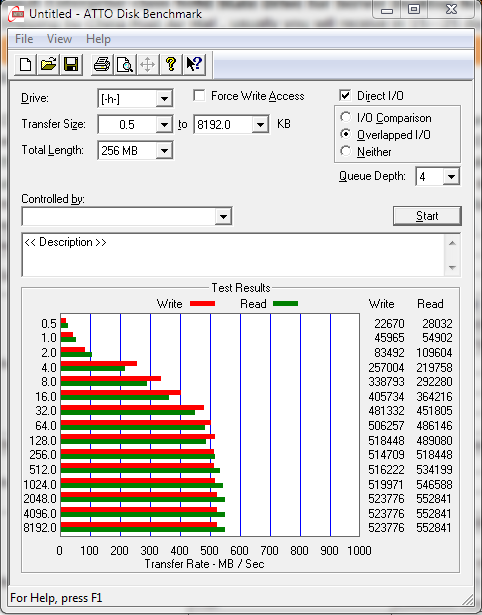ATTO Disk Benchmark is perhaps one of the oldest benchmarks going and is definitely the main staple for manufacturer performance specifications. ATTO uses RAW or compressible data and, for our benchmarks, we use a set length of 256mb and test both the read and write performance of various transfer sizes ranging from 0.5 to 8192kb. Manufacturers prefer this method of testing as it deals with raw (compressible) data rather than random (includes incompressible data) which, although more realistic, results in lower performance results.
With highs of 552MB/s read and 523MB/s write performance, the KingSpec E3000s SSD is well above posted specs of 500MB/s read and 480MB/s write performance and definitely in line with what we might see in typical LSI SandForce based SSDs. KingSpec would be smart to alter their specs to reflect these scores and be in line with well over 50 other LSI SandForce partners.
CRYSTAL DISK BENCHMARK VER. 3.0 X64
Crystal Disk Benchmark is used to measure read and write performance through sampling of highly compressible data (oFill/1Fill), or random data which is, for the most part, incompressible. We have provided the results of testing in highly compressible data on the left and that of highly incompressible data on the right.

 Crystal DiskMark is typically a bit lower than ATTO results, however, our interest lies in the result on the right. Incompressible data was utilized in the right test and many could normally identify this through lower sequential and 512K write results in comparison to the result on the left. These are typical of LSI SandForce Driven SSDs solely because these utilize compression in storage.
Crystal DiskMark is typically a bit lower than ATTO results, however, our interest lies in the result on the right. Incompressible data was utilized in the right test and many could normally identify this through lower sequential and 512K write results in comparison to the result on the left. These are typical of LSI SandForce Driven SSDs solely because these utilize compression in storage.
On the same front, the incompressible data testing result on the right has also provided an amazing 4k random write transfer speed of 112MB/s which we rarely see. Many consider this specific disk access the ‘meat and gravy’ of visible improvement and it is rare that results above 100MB/s are accomplished. Accordingly, the only time we have ever seen such is with SSDs that ended up being upper tier, and mostly, top ranked SSDs.
Up until recently, AS SSD was the only benchmark created specifically for SSD testing and it uses incompressible data. AS SSD, for the most part, gives us the ‘worst case scenario’ in SSD transfer speeds because of its use of incompressible data and many enthusiasts like to AS SSD for their needs. Transfer speeds are displayed on the left with IOPS results on the right.

 AS SSD test results don’t really show off the E3000S and we expected a much higher IOPS result as well as AS SSD Score. The AS SSD Copy Benchmark, on the other hand, displayed excellent results with some of the fastest transfer speeds and quickest file transfer times we had seen yet.
AS SSD test results don’t really show off the E3000S and we expected a much higher IOPS result as well as AS SSD Score. The AS SSD Copy Benchmark, on the other hand, displayed excellent results with some of the fastest transfer speeds and quickest file transfer times we had seen yet.
 The SSD Review The Worlds Dedicated SSD Education and Review Resource |
The SSD Review The Worlds Dedicated SSD Education and Review Resource | 

Why is it that the majority of “Enterprise” SSDs are only available SATA interfaces and not SAS?
It is a combination of the fact that SATA is more common and, with respect to enterprise, there are much fewer SAS SSDs to be tested. We can compound this even further with the fact that these drives usually value considerably higher and many companies have yet to rely on such testing by SSD review sites.
This is correct. Just like PNY there will be shallow support for firmware and they will never get on the LSI supported drive list. If you are not on the LSI or Adaptec supported list, the first answer from support will be – you are not using a supported drive. End of support. The PNY Prevail reviewed here, I had to return due to ghetto wire (patch wires) which is pretty scary. I can only hope this company will update their firmware and fix the bugs quickly. PNY did not and was an epic fail.
Also remember Mixing sata and sas will result in SAS dropping its LVD voltage down to SATA levels causing less stability. This is why many companies still use interposers so you do not have the STP protocol overhead and SATA voltage levels. LSI controllers let you mix sata and sas withing a raid-set. I have found that many oem’s have problems with generic sata drives but not their own custom firmware drives.
LSI based cards, say PERC H700 with samsung 840 pro – have problems with drives dropping? I’ll tell you exactly why. The 830 ignored the SAS commands that dell added to their samsung drives. The 840 pro resets and is marked for failure.
You really need to be careful when you mix consumer chipsets and try to use them with enterprise controllers.
That’s not entirely correct. All SF SSDs are on the supported drive list and FW is forwarded as validated. PNY is up to date and had to wait for exactly that.
Thanks for the input!
gotta love the black pcb 😀
Awesome the black PCB and the 10 000 times P/E nand chip